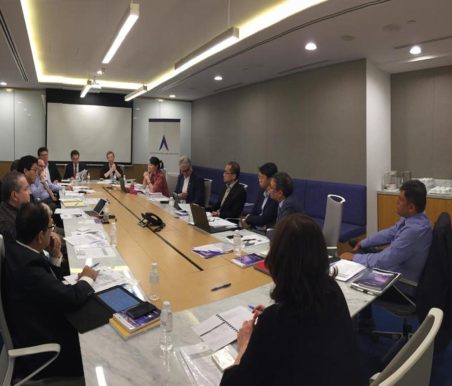ABLI has recently learned of a judgment by the Delhi High Court dated 18 September 2018 in which the Court examined whether a winding up petition is maintainable on the basis of a foreign decree and whether the Company Court can question the validity of such a decree under section 13 of the Civil Procedure Code, 1908 (CPC) if such a petition is maintainable, among others.
Section 13 of the CPC lists circumstances under which a foreign judgment is not considered conclusive, including but not limited to where the foreign judgment was not given on the merits of the case and where the proceedings in which that judgment was obtained are opposed to natural justice.
In the case of Singapore Telecommunications Ltd v APM Infotech Pvt Ltd (Co. Pet. 198/2012), Singapore Telecommunications, or Singtel, filed a petition seeking the winding up of APM Infotech, or APM, under India’s Company Act.
The background to this winding-up petition is that APM, the respondent, had failed to pay Singtel for services provided by the latter under two service agreements over several months in 2006. As those agreements were governed by Singapore law, Singtel commenced proceedings in the Singapore High Court which eventually delivered a monetary judgment in favor of Singtel in May 2011. APM failed to appear before the Singapore proceedings despite being summoned. In July 2011, Singtel issued a notice for statutory winding up of APM in India. APM denied the contents of the notice about one week later.
Among other arguments, counsel for Singtel, citing a precedent, contended that a winding up petition would lie on the basis of a foreign decree, in this case the Singapore judgment. Specifically, counsel pleaded that APM was duly served for proceedings before the Singapore High Court.
Counsel for APM argued, among others, that all defences available under section 13 of the CPC should be available in the winding up petition. As counsel believed that APM was not properly served for the Singapore proceedings, the Singapore judgment was obtained in breach of natural justice.
In summary, the Delhi High Court found that:
A winding up petition filed on the basis of a foreign decree is maintainable. It is unnecessary for the holder of that foreign judgment to first execute that judgment by applying for execution and getting the validity of the judgment tested against section 13 of the CPC.
However, the judgment debtor of that foreign judgment has the right to demonstrate that the foreign judgment is not binding on the ground that it offends any of the provisions under section 13 of the CPC, and the Company Court has to test the foreign judgment against that section.
In the present case, it is found that service of the Singapore proceedings on APM was problematic because it went to the residential address of APM’s contact person rather than the address stated in the two service agreements. In any case, service at the residential address was denied by a servant of that person. Further, notice by email was also sent to an email address other than those listed in the service agreements.
Based on the above and other grounds, the Company Court found the disputes on service raised by the respondent bona fide, and accordingly dismissed the winding up petition. The petitioner was granted liberty to apply to the executing court for executing the Singapore judgment under section 44A of the CPC so that the objections raised by the respondent could be examined in detail under section 13.
It is also interesting that the Singapore judgment relied on by Singtel in the winding up petition, Singapore Telecommunications Ltd v APM Infotech Pte Ltd [2011] SGHC 147, specifically stated that it was given after the Court has exercised its inherent jurisdiction to enter judgment upon considering the merits of the plaintiff’s (i.e. Singtel) case under the Rules of Court rather than in default of appearance of the defendant (i.e. APM). This is because the enforceability of a foreign judgment may be challenged in India if it had been given on account of the defendant’s default of appearance without any consideration of the evidence or the pleadings. As mentioned earlier, a foreign judgment not given “on the merits” is not considered conclusive under section 13 of the CPC.
The full text of the Singapore judgment is available here. The Judgment by the Delhi High Court can be read here.
We thank Professor Narinder Singh for informing us of the India judgment. Professor Singh wrote the India chapter in Recognition and Enforcement of Foreign Judgments in Asia, and is also author of the Principles on fraud and in rem judgments in Asian Principles for the Recognition and Enforcement of Foreign Judgments.
Whilst every effort has been made to ensure that the information contained in this update is correct, the Asian Business Law Institute disclaims all liability and responsibility for any error or omission in this update, and in respect of anything, or the consequences of anything, done or omitted to be done by any person in reliance, whether wholly or partially, upon the whole or any part of the contents of this update.


![[Press Release] New Collaboration to Drive [Press Release] New Collaboration to Drive](https://abli.asia/wp-content/uploads/elementor/thumbs/Press-Release-New-Collaboration-to-Drive-r77cg8egwdcvysc4gdtoopi9zc35ndhtr5eew3yd28.jpg)
![[Interview] Landmark Indonesian Recognition [Interview] Landmark Indonesian Recognition](https://abli.asia/wp-content/uploads/elementor/thumbs/Interview-Landmark-Indonesian-Recognition-r77cnxouwhwh3r5ch7omm9j9804fq32n59ungqj82o.jpg)


